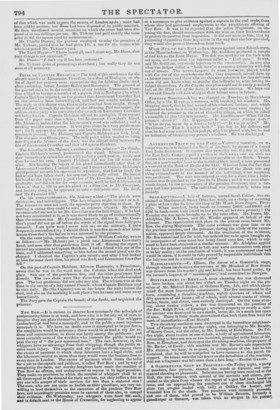Tow Row.—It is curious to observe how constantly the principle
of compensatingforces is at work, and how vain it is for any set of men to imagine they can place themselves beyond its operation. The whippers (unloaders) of coal have a monopoly, and to the public a most injerious monopoly it is. We have no doubt were it attempted to be put down, the complaints would be grievous ; there would be as loud a cry for redress and remuneration, as there was lately among the publicans ; and most certainly some of the worthies who instruct the public would repeat the cry of "the poor oppressed men." The fact, however, is, the whippers have no advantage from their whipping, though the public receive much injury. The captain and the publican divide among them the excess of payment to which these labourers have a legal claim, and the labourers receive no more than they would were the business free to everyman in London. The excess of payment which forms the bribe for a job to the captain and publican, is called Tow Row ; and by way of completing the farce, our worthy lawgivers have made the exaction of Tow Row an offence, and endeavoured to repress it by legal penalties. They make no provision by which the number of whippers shall be at all times equal to the demand for their services, yet they inflict a fine on any one who accepts of their services for less than a statuted sum ! The men, who are not quite so foolish as their guardians, are very unwilling to lend themselves to the execution of the precious Tow Row laws, and accordingly penalties must be exacted of these also, to compel their evidence. On Wednesday, two whippers were fined 20/. each, and in default sent to the House of Correction, for neglecting to appear on a summons to give evidence against a captain in the coal trade, from whom they had purchased employment by the propitiatory offering of Tow Row. It was to be expected that the police Magistrate, on im. posing the fine, should remonstrate with the men on their backwardness to protect themselves from imposition, it did not occur to him, that by protecting themselves from imposition in the way that the law provided, they would also protect themselves from work.
WtsE MEN or Tim Easr.—In a charge against some fish-salesmen, at the Mansionhonse, on Wednesday, Mr. Goldham produced a sample of foul fish to the Lord Mayor. The fish was speckled on the back with red spots, and was what the salesmen called a " Harlequin." It was, said Mr. Goldham, extremely injurious to the constitution. It was also what the judges called a "hook-nose"--a common deformity with fish out of season. The tavern-keepers, in some instances, played tricks with the roe of the unwholesome fish ; they frequently served them up as lobster sauce ; and those who eat this nice substitute for that delicious sauce did not know what to ascribe the bellyache to, after haying in. (bilged themselves. In the City the deception could not be easily practised, but, at the West end of the town, it was quite common. 'We hope our West end friends will look sharp to their lobster sauce in future.
Fonntest BODIES.—A boy was charged on Tuesday, at Marylebone Office, by a Mr. Hopping, a surgeon, with breaking his windows. Mr. Hoppieg stated, that he had several of his windows broken, and which appeared to have been done by bullets or pellets from some engine ; he observed the prisoner in the act of throwing things, on which he called a constable to give him into custody. Mr. Rawlinson—" What did the prisoner throw ?" Mr. Hopping—" It WitS some foreign body." " What do you mean by a foreign body ?"—" It was an acorn." Mr. Rawlinson.—" That is a native body." The boy in his defence, said that he had some acorns in his pocket, which he played with, but he had no intention of breaking any person's windows. He was discharged.


























 Previous page
Previous page